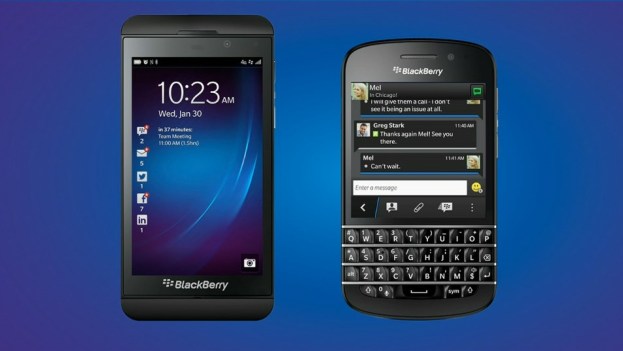 One thing that the-company-formerly-known-as-RIM sure wants to hold on to is its strong relationship with business users, although admittedly even that has been slipping away in recent years. The recently launched BlackBerry 10 platform is supposed to win back government agencies and businesses who’ve deserted the mobile company for competing handsets like the iPhone or devices running Android.
One thing that the-company-formerly-known-as-RIM sure wants to hold on to is its strong relationship with business users, although admittedly even that has been slipping away in recent years. The recently launched BlackBerry 10 platform is supposed to win back government agencies and businesses who’ve deserted the mobile company for competing handsets like the iPhone or devices running Android.
But the early signs are that things may not be going as well as hoped, with a Guardian report on Tuesday indicating that the UK government has rejected the new BlackBerry 10 platform for not being secure enough.
The report said that tests carried out by the government’s Communications-Electronics Security Group (CESG) on the BlackBerry 10 platform and its Balance software – designed to allow users to keep work and personal accounts on their device separate – have shown that, for now at least, the device is not secure enough.
It’s expected that BlackBerry will submit revised software in an effort to get security clearance, but the company reportedly has no timeframe laid out as for when this might happen. BlackBerry has a long-standing relationship with the UK government, with versions of BlackBerry’s mobile OS prior to BB10 obtaining security clearance, so the rejection of BB10 is a serious setback.
BlackBerry desperately needs BB10 to take off in a big way if the company is to continue in its current form. Since the iPhone and various Android-powered Samsung handsets came on the scene, BlackBerry has seen its share of the market shrink dramatically – especially in the US where it’s lost some 14 million users in less than three years.
‘Wait six months’
News of the UK government’s decision to hold off on switching to BB10 comes at the same time as technology research firm Gartner is advising companies to wait six months before investing in BlackBerry Enterprise Service 10 (the company’s mobile device management software), or essentially “until it is clear that BB10 has proven successful in the consumer market.”
“It is important to wait to make any moves toward full support of BB10 devices until the market makes a clear statement on BB10’s success (or lack thereof),” Gartner said in its report.
It added that it believed the Ontario-based company would need at least three years to gain even a five percent share of the global smartphone market. Gartner also said that the success of BB10 will come down to how effectively BlackBerry markets its new platform, describing the challenge as “daunting”.
Talking of marketing, BlackBerry CEO Thorsten Heins is already doing his best to beat down the opposition, saying in an interview this week that he thought the iPhone’s interface was outdated, though he said he respected Apple’s work in revolutionizing the smartphone market.
This is a crucial week for BlackBerry, with its new Z10 handset set to launch in the US on Friday. The new device, which has been available for over a month in other parts of the world, has been generally well received, but the jury is still out on whether it will be able to save the company. Like Gartner says, the picture will likely be much clearer in six months’ time.
[Update] BlackBerry has issued a statement (below) dismissing reports that the UK government has rejected its new BB10 platform. The Guardian, the source of the story, has since removed its article without explanation.
Media reports alleging that BlackBerry 10 has been ‘rejected’ for U.K. government use are both false and misleading. BlackBerry has a long-established relationship with CESG and we remain the only mobile solution approved for use at ‘Restricted’ when configured in accordance with CESG guidelines. This level of approval only comes following a process which is rigorous and absolutely necessary given the highly confidential nature of the communications being transmitted. The current re-structuring of this approval process, due to the Government Protective Marking Scheme review and the new CESG Commercial Product Assurance scheme has an impact on the timeline for BlackBerry 10 to receive a similar level of approval. The U.S. government’s FIPS 140-2 certification of BlackBerry 10 and the selection of BlackBerry 10 by the German Procurement Office and Federal Office for Information Security (BSI) underline how our new platform continues to set the standard for government communications. We are continuing to work closely with CESG on the approval of BlackBerry 10 and we’re confident that BlackBerry 10 will only strengthen our position as the mobile solution of choice for the U.K. government.
[Update 2] CESG has also issued a statement (below), saying it is still in talks with BlackBerry about using its platform.
Discussions with BlackBerry are ongoing about the use of the BlackBerry 10 platform in government. We have not yet performed an evaluation of the security of the platform, but we expect to be issuing Platform Guidance in the summer. This will cover a number of platforms, including BlackBerry 10 (and the use of ‘Balance’). We have a long-standing security partnership with BlackBerry, and this gives us confidence that the BlackBerry 10 platform is likely to represent a viable solution for UK Government.


